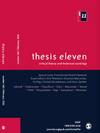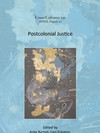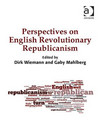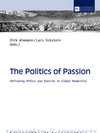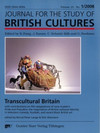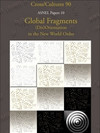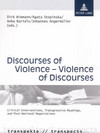Postcolonial World Literatures
Special Issue Thesis Eleven 162.1 (2021). Ed. with Ira Raja and Shaswati Mazumdar.
Postcolonial criticism has repeatedly debunked the ostensible neutrality of the ‘world’ of world literature by pointing out that and how the contemporary world – whether conceived in terms of cosmopolitan conviviality or neoliberal globalization – cannot be understood without recourse to the worldly event of Europe’s colonial expansion. This special issue of Thesis Eleven assembles a number of critical interventions that aim to read world literature as constitutively postcolonial and to bring the two eminently relevant discussions -- the one on world literature, the other on the postcolonial -- together in a productive way.
Postcolonial Justice
Ed. with Anke Bartels, Lars Eckstein and Nicole Waller. Amsterdam & New York: Brill 2017.
Postcolonial Justice addresses a major issue in current postcolonial theory and beyond, namely, the question of how to reconcile an ethics grounded in the reciprocal acknowledgment of diversity and difference with the normative, if not universal thrust that appears to energize any notion of justice. The concept of postcolonial justice shared by the essays in this volume carries an unwavering commitment to difference within and beyond Europe, while equally rejecting radical cultural essentialisms, which refuse to engage in “utopian ideals” of convivial exchange across a plurality of subject positions. Such utopian ideals can no longer claim universal validity, as in the tradition of the European enlightenment; instead they are bound to local frames of speaking from which they project worlds.
Perspectives on English Revolutionary Republicanism
Ed. with Gaby Mahlberg. Farnham (Ashgate) 2014, 238 pp.
Perspectives on English Revolutionary Republicanism takes stock of developments in the scholarship of seventeenth-century English republicanism by looking at the movements and schools of thought that have shaped the field over the decades: the linguistic turn, the cultural turn and the religious turn. While scholars of seventeenth-century republicanism share their enthusiasm for their field, they have approached their subject in diverse ways. The contributors to the present volume have taken the opportunity to bring these approaches together in a number of case studies covering republican language, republican literary and political culture, and republican religion, to paint a lively picture of the state of the art in republican scholarship. The volume begins with three chapters influenced by the theory and methodology of the linguistic turn, before moving on to address cultural history approaches to English republicanism, including both literary culture and (practical) political culture. The final section of the volume looks at how religion intersected with ideas of republican thought. Taken together the essays demonstrate the vitality and diversity of what was once regarded as a narrow topic of political research.
“Readers of this stimulating collection will find plenty of food for thought, especially in its welcome exploration of religion’s place in republican thinking.” – Bernard Capp, English Historical Review (April 2016)
“This volume offers refinements rather than breakthroughs. But the refinements are significant: the level of scholarship is generally high and at times outstanding, as attested by the volume’s comprehensive bibliography. “ – Feisal G. Muhamed, Renaissance Quarterly 68.3 (2015)
” a balanced treatment, and the reader will appreciate the neatly organised format.” – Lindsay Breach, Parerga 33.2 (2016), 199-200.
European Contexts for English Republicanism
Ed. with Gaby Mahlberg. London (Routledge) 2013, 288 pp.
European Contexts for English Republicanism offers new perspectives on early modern English republicanism through its focus on the Continental reception of and engagement with seventeenth-century English thinkers and political events. Looking both at political ideas and at the people that shaped them, the collection examines English republican thought in its wider European context during the later seventeenth and eighteenth century. In a number of case studies, the contributors assess the different ways in which English republican ideas were not only shaped by the thought of the ancients, but also by contemporary authors from all over Europe, such as Hugo Grotius or Christoph Besold. They demonstrate that English republican thinkers did not only act in dialogue with Continental authors and scholars, their ideas in turn also left a long-lasting legacy in Europe as they were received, transformed and put to new uses by thinkers in France, Italy, the Netherlands, Germany and Poland. Far from being an exclusively transatlantic affair, as much of the established scholarship suggests, English republican thought also left its legacy on the European Continent, finding its way into wider debates about the rights and wrongs of the English Civil War and the nature of government, while later translations of English republican works also influenced the key thinkers of the French Revolution and the liberals of the nineteenth century. Bringing together a range of fresh and original essays by British and European scholars in the field of early modern intellectual history and English studies, this collection of essays revises a one-sided approach to English republicanism and widens the scope of study beyond linguistic and national boundaries by looking at English republicans and their continental networks and legacy.
“Collectively, the essays in this volume highlight the complexity in untangling the threads of English republicanism as it wove its way through two centuries of continental thought, and in doing so clearly demonstrate the benefits of a collaborative, interdisciplinary approach.” – Victoria Anker, The Seventeenth Century 29.2 (2014)
“The collection of thought-provoking essays contained herein make European Contexts for English Republicanism essential reading for students of English republicanism and of early-modern political thought more broadly.” – Matthew Jonston, History of European Ideas (2014)
“Gaby Mahlberg and Dirk Wiemann’s excellent collection of essays, European Contexts for English Republicanism, is a much-needed, groundbreaking work. … Early modern intellectual historians will find it useful and enjoyable for many years to come. Historians of the book, legal and political historians, as well as early modern European historians will only benefit from it.” – Vittoria Feola, Sixteenth Century Journal, 45.4 (2014)
“Jede weitere Forschung zu diesem Thema wird mit Gewinn von den in diesem Band versammelten Fallstudien ihren Ausgang nehmen” – Peter Schröder, Zeitschrift für historische Forschung 42.4 (2015)
“The collection effectively demolishes any notion of English insularity regarding the political thinking of the Interregnum, and anybody interested in the lives and adventures of texts rather than human beings will read the book with profit.” – Jutta Schwarzkopf, Journal for the Study of British Cultures (2.2014)
The Politics of Passion: Reframing Affect and Emotion in Global Modernity.
Ed. with Lars Eckstein. Frankfurt (Lang) || Toronto (University of Toronto Press) 2013, 233 pp.
The demise of the modern self-centred subject does not engender a waning but a politicisation of affect: The site of passion is now no longer the individual’s interiority but the contact zone of intersubjective encounters. The public and political status of the emotions thus becomes apparent, making visible how affects are embedded in and shaped by discursive regimes. Neither spontaneous nor overdetermined, passion is therefore not the «other» of reason but a deeply social energy that fuels political, cultural and everyday practices. The Politics of Passion combines theoretical reframings of affect and emotion in global modernity with analyses of concrete instances of politics of passion from above or from below. By including debates and struggles in Western, Asian and African contexts, the volume attends to the actual plurality of affective rationalities and politics beyond a Eurocentric framework.
Transcultural Britain
Special issue of Journal for the Study of British Cultures (vol. 15.1, 2008). Ed. with Bernd-Peter Lange
With articles on the Indianisation of Jane Austen’s “Pride and Prejudice”, the negotiation of Little British national identity in television comedy, football after the nation, and recent developments in Black British arts.
Global Fragments: (Dis)Orientation in the New World Order.
Ed. with Anke Bartels. Amsterdam & New York (Rodopi) 2007, 378 pp.
While the world seems to be getting ever smaller and globalization has become the ubiquitous buzz-word, regionalism and fragmentation also abound. This might be due to the fact that, far from being the alleged production of cultural homogeneity, the global is constantly re-defined and altered through the local. This tension, pervading much of contemporary culture, has an obvious special relevance for the new varieties of English and the literature published in English world-wide. Postcolonial literatures exist at the interface of English as a hegemonic medium and its many national, regional and local competitors that transform it in the new English literatures. Thus any exploration of a globalization of cultures has to take into account the fact that culture is a complex field characterized by hybridization, plurality, and difference. But while global or transnational cultures may allow for a new cosmopolitanism that produces ever-changing, fluid identities, they do not give rise to an egalitarian 'global village' - an asymmetry between centre and periphery remains largely intact, albeit along new parameters. The essays collected in this volume offer readings of literary, theoretical, and filmic texts from the postcolonial world. These texts are read as attempts to articulate the global with the local from a perspective of immersion in the actual diversity of life-worlds, focusing on such issues as consumption, identity-politics, and modes of affiliation. In this sense, they are global fragments: locally refractured figurations of an experience of world-wide interconnectedness.
Reviewed by - Eric Anchimbe, European English Messenger 17.1 (2008), 77-81. - Andrew Monnickendam, Commonwealth Essays and Studies, Vol. 31.1 (2008), 117-119.
Only Connect: Texts, Places, Politcs. A Festschrift for Bernd-Peter Lange
Ed. with Anke Bartels and Reinhold Wandel. Frankfurt (Lang) 2008, 332 pp.
This collection of articles, presented on Bernd-Peter Lange’s 65th birthday, tries to capture some of the manifold domains that he has worked to connect as one of the protagonists in the opening up of German Anglistik to Cultural Studies and Postcolonial Theory. The volume proceeds from literature, with the first section offering a variety of readings and rereadings of classic English texts. The subsequent sections focus on the dynamics of inclusion and exclusion that define mainstream and minorities, engage with cultural mobility as well as the various ways in which cultural space is represented and offer a variety of reflections on the relations that pertain between the fields of cultural representation and politics.
Discourses of Violence – Violence of Discourses: Critical Interventions, Transgressive Readings, and Post-National Negotiations.
Ed. with Johannes Angermüller, Anke Bartels and Agata Stopinska. Frankfurt (Lang) 2005, 229 pp.
The issues of violence and its control, containment or overcoming range prominently in the social sciences. Empirical sociology seeks to derive generalizable explanations from its research into concrete cases of the occurrence or absence of violent conflict, aspiring to transform such explanations into instructions for strategic action. Within cultural studies, discursive and epistemic formations are assumed to be fundamentally and endemically violent. In these perspectives, the quotidian violence that ineluctably inheres in modern discourses manifests itself as, e.g., normalisation, privilege and exclusion, thus sharing a wide range of common objects and objectives with the social sciences. The essays collected in this volume address contemporary conjunctures and discourses of violence in world society from different disciplines ranging from cultural studies, social science, political science and philosophy to history, literary criticism and psychology.
Reflexive Representations: Discourse, Power, and Hegemony In Global Captialism.
Ed. with Johannes Angermüller, Dietmar Fricke and Jörg Meyer. Münster (LIT) 2004, 192 pp.
Reflexive Representations addresses the manifold conjunctures, interactions and disjunctures that occur at various levels of what has come to be rubricated under the buzzword of “globalization”. While this term has the merit of reperiodizing our account of the capitalist dynamics, it simultaneously points to a crisis of representation both in political and epistemological terms. The contributions collected in this volume – being reflexive representations from the social sciences and humanities – assess some of the manifold aspects of this crisis.

